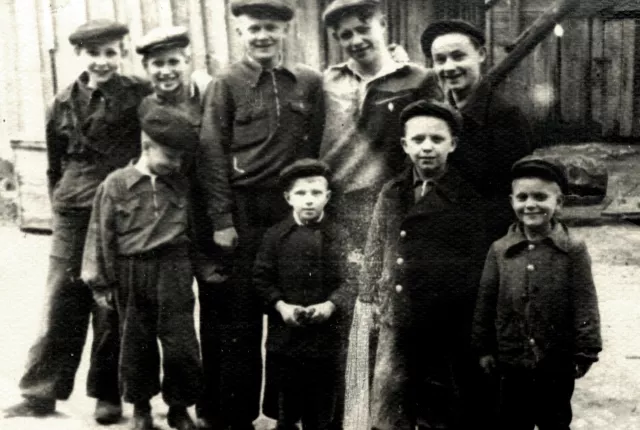Naum Bitman with friends from his yard
All guys from our yard photographed 1950 in our yard in Kiev. I, Naum Bitman, in the second row second on the right, wearing a light jacket and a cap.
I must confess that I felt ashamed if Granny spoke Yiddish at home in the presence of my friends. I was so ashamed. I didn't know where to put myself. That was what the system did to us - that people were ashamed of their own mother tongue. Wen I grew older I went to the Caucasus and I saw smaller children speaking Georgian, Azerbaijan. And I began to think why my Granny's mother tongue seemed such a burden to me. I understood Yiddish a little but I couldn't read or write and I cannot know.
When I grew older I tried to figure out why the word "zhyd" was so widely used to abuse the Jews. Podol where we were living was historically the place where many Jewish people were living. And so, we had about 80 per cent of Jews in our class and for some time we didn't feel any anti-Semitism because there were quite a few of us. Eizenstein, Rubinstein, Golberg were my classmates. Then it occurred to me that when it was said: people, friendship of the people, we all went through the war - Ukrainians, Russians, Byelorussians, Lithuanians, Uzbek - they never mentioned Jewish people. Not even as an example. It happened so that there was a small group of Jewish students in our class - about seven of us. We were friends, spent much time together, but we never spoke about our nation then. Nobody talked about Bebiy Yar then. If, for example, somebody asked: "Where is Zhenia Goldinova?" - "She went away to Babiy Yar". This could only be said in everyday conversation, and with lowered voice. Nobody said then that Kiev was a place of mass tragedy like Treblinka, Aushwitz, Buchenwald.
Now I am surprised at our complete unawareness of what was going on in our country. There wasn't even a hint to guess. We went for walks on the embankment and we had discussions, but never did we talk about the repressed or exterminated people. Much later I learned about the "case of doctors", struggle with the cosmopolites when they put that time in the open. Maybe we didn't subscribe to newspapers in our family - I don't remember. But it is true that neither my friends nor I ever talked about something we were not supposed to know. Perhaps, we were afraid of each other. This generation got used to be silent, you know. Osip Mandelshtam, a great Soviet poet, a Jew, that was repressed and perished, wrote in a poem that we did not feel our country under our feet and were talking so low that our voices were not heard in 10 steps' distance.
Although there were quite a few Jews among my friends we all spoke Russian to one another. Nobody knew Yiddish. We didn't know either the national culture or history but at least nobody called one another "zhyd".












